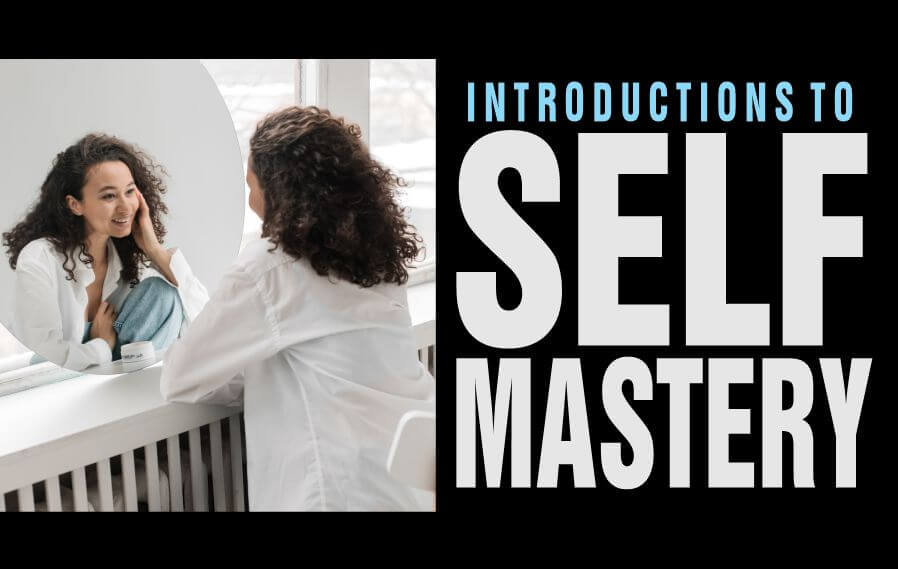Last updated on June 10th, 2025 at 02:07 pm
Discover the secrets of self-mastery, gaining control over your thoughts, emotional awareness, and actions to boost personal growth and success.
Self-mastery is the mastery of self – understanding and controlling your thoughts, emotions, and actions to achieve personal growth and fulfillment.
It hinges on mastering self-discipline, resilience, and awareness, enabling you to navigate life’s challenges with grace and purpose.
In this article, we have simplified the steps you need to follow to master yourself in preparation for life mastery.
Recommended: How to Fortify Your Life with Emotional Mastery
Table of Contents
- What is Self Mastery?
- Principles and Pillars of Self-Mastery
- Benefits of Self-mastery
- Developing Self Mastery
- Tools and Techniques for Self-Mastery
- Frequently Asked Questions
- Conclusion
What is Self Mastery?

Self-mastery is having a firm grip on your thoughts, emotions, and behaviors, knowing your strengths and weaknesses, and using this knowledge to steer your life in the desired direction.
It involves developing self-awareness, self-discipline, and resilience to achieve personal growth, life goals and fulfillment.
By cultivating self-regulation, you can improve your ability to make conscious choices, set and achieve meaningful goals, and effectively manage stress and adversity.
Related: 5 Obstacles to Mastering the Self
Principles and Pillars of Self-Mastery
1. Self-awareness
Self-awareness involves understanding yourself, your strengths, weaknesses, desires, and beliefs, which are shaped by the core principles of life.
It is the first step towards self-mastery as it allows you to identify areas for improvement and personal growth.
2. Self-discipline
Self-discipline is the ability to control your impulses and follow through on your goals and commitments. It involves setting boundaries, establishing routines, and practicing self-control to achieve personal and professional success.
3. Self-confidence
Self-confidence is the belief in one’s abilities, values, and worth. It is essential for self-mastery as it allows individuals to take risks, overcome challenges, and pursue their goals with conviction and determination.
4. Self-reflection
Self-reflection involves examining one’s thoughts, feelings, and behaviors to learn from past experiences and make better decisions in the future.
It is a key component of self-mastery as it promotes self-awareness, personal growth, and emotional intelligence.
5. Self-compassion
Self-compassion involves treating oneself with kindness, understanding, and acceptance, especially in times of failure or adversity.
It is essential for self-mastery as it fosters resilience, self-care, and a positive self-image.
6. Emotional Mastery
Emotional mastery involves understanding and managing your emotions healthily and constructively.
It involves developing emotional intelligence, self-regulation, and coping skills to navigate life’s challenges with grace and resilience.
7. Mental Mastery
Mental mastery involves training your mind to think critically and creatively.
It involves cultivating a growth mindset, practicing mindfulness, and challenging negative thought patterns to enhance cognitive abilities and problem-solving skills.
8. Physical Mastery
Physical mastery involves taking care of your body through proper nutrition, exercise, and self-care practices.
It involves prioritizing health and well-being to maintain energy, vitality, and overall fitness for optimal performance and personal fulfillment.
9. Spiritual Mastery
Spiritual mastery involves connecting to a higher purpose, meaning, or belief system that aligns with your values and principles.
It involves cultivating a sense of inner peace, gratitude, and connection to something greater than yourself to find fulfillment, purpose, and harmony in life.
10. Time Management
Time management is a crucial principle of self-mastery, enabling you to prioritize tasks, set goals, and allocate resources effectively.
By organizing time wisely, you can reduce stress, enhance productivity, and create a balanced life.
Benefits of Self-mastery

The benefits of mastering yourself are numerous and impactful, leading to a more fulfilling and successful life.
Let’s take a closer look…
Improved Decision-making Skills
When you have attained self-governance, you confidently make important decisions as you can align your choices with your long-term goals and values, resulting in better outcomes in both your personal and professional life.
Enhanced Personal and Professional Relationships
Self-mastery enhances emotional intelligence and empathy.
By understanding and managing your own emotions, you can communicate more effectively, resolve conflicts constructively, and build deeper connections with others.
This leads to healthier, more fulfilling relationships both at home and in the workplace.
Increased Productivity and Efficiency
It helps individuals develop discipline, focus, and self-control.
This leads to improved time management, prioritization, and goal-setting abilities, allowing individuals to maximize their productivity and efficiency.
By eliminating distractions and maintaining a clear focus, individuals can achieve more in less time and experience a greater sense of accomplishment.
Greater Sense of Purpose and Fulfillment
Mastering yourself involves discovering and living in alignment with one’s purpose and values.
By gaining insight into their passions and strengths, individuals can pursue meaningful goals that bring them a sense of fulfillment.
This alignment between personal values and actions fosters a greater sense of purpose, leading to a more satisfying and purpose-driven life.
Better Stress Management and Well-being
It equips individuals with strategies to handle stress effectively.
Through techniques like mindfulness, self-reflection, and self-care, individuals can reduce stress levels, enhance resilience, and improve overall well-being.
By taking control of their thoughts and emotions, individuals can respond to challenging situations more calmly and rationally, leading to improved mental and emotional health.
Suggested: How to Overcome Limiting Beliefs
Developing Self Mastery

Developing self-possession is about taking responsibility for your actions and choices and striving to become the best version of yourself.
Here are ways to achieve that:
Self-reflection and Introspection
Self-reflection helps assess your strengths and weaknesses, enhancing self-awareness and personal development. It also involves identifying and changing limiting beliefs and self-sabotaging patterns to promote self-regulation and growth.
Setting Meaningful Goals
The SMART framework ensures goal clarity by making them Specific, Measurable, Achievable, Relevant, and Time-bound. Prioritizing goals based on importance and personal values helps maintain focus and effectively allocate resources, supporting progress toward self-mastery.
Cultivating Self-discipline and Creating Positive Habits
Cultivating self-discipline and positive habits is crucial for self-mastery. Self-discipline involves controlling behavior and emotions, while positive habits support growth and success.
Key strategies include setting specific goals, breaking tasks into manageable steps, prioritizing tasks, creating a routine, and using time management techniques. These practices enhance focus, reduce procrastination, and establish consistency.
Implementing Effective Habit-building Techniques
Start by focusing on one small habit at a time and set achievable goals that build gradually. Consistent practice and repetition help solidify the habit.
Share goals with a friend or mentor for accountability, monitor progress to reinforce habit-building, and reward yourself for staying on track.
Embracing Continuous Learning and Growth
Seeking feedback and constructive criticism helps identify areas for improvement and fosters growth. Embracing challenges and stepping outside your comfort zone build resilience, confidence, and new skills, essential for personal development and self-mastery.
Tools and Techniques for Self-Mastery
Tools and techniques for mastery of the self are practices and methods that you can employ to gain control over your thoughts, emotions, behaviours, and overall well-being.
These tools and techniques can help you in your journey to personal growth, self-awareness, and achieving your desired outcomes in life.
Let’s take a closer look…
Mindfulness and Meditation
Mindfulness involves being fully present in the moment and non-judgmentally aware of your thoughts, feelings, and sensations. Meditation is a technique to cultivate mindfulness through focusing attention or redirecting thoughts. These practices can enhance self-awareness, reduce stress, improve focus, and promote inner calm.
Journaling and Self-reflection Exercises
Journaling involves regularly writing down thoughts, emotions, and experiences. It provides a space for self-reflection, exploring patterns, gaining insights, and promoting self-expression. Self-reflection exercises involve engaging in introspection to understand oneself better, evaluate goals, and make conscious choices.
Developing Emotional Intelligence
Emotional intelligence refers to the ability to recognize, understand, and manage your own emotions and empathize with others. Tools for developing emotional intelligence include self-awareness exercises, emotional regulation techniques, cultivating empathy, and improving communication and interpersonal skills.
Time Management and Prioritization Strategies
These tools help you effectively manage your time, set priorities, and maximize productivity. Techniques include making to-do lists, setting SMART goals, using productivity apps, delegating or outsourcing tasks, and practicing effective decision-making.
Stress Management Techniques
Stress management tools aim to reduce and cope with stress effectively. These techniques might include exercise, deep breathing exercises, practicing relaxation techniques like meditation or yoga, setting boundaries, time for self-care, and seeking support from others.
Seeking Support Through Coaching or Therapy
Seeking support from a coach or therapist can provide guidance, feedback, and a safe space for self-exploration. Coaches can help individuals set goals, develop strategies, and hold them accountable. Therapy can assist in addressing mental health concerns, past traumas, and emotional challenges, providing tools for resilience and personal growth.
Frequently Asked Questions
What is the concept of self-mastery?
The concept of self-mastery refers to the process of gaining control and mastery over oneself, including thoughts, emotions, behaviors, and actions, to achieve personal growth and fulfillment.
What are the 4 elements of self-mastery?
The four elements of self-mastery typically include self-awareness, self-discipline, self-control, and self-empowerment. These elements work together to cultivate personal growth and achieve mastery over oneself.
What is the first step to self-mastery?
The first step to mastery of yourself is self-awareness. It involves understanding one’s strengths, weaknesses, values, beliefs, and patterns of behavior, providing a foundation for personal growth and development.
What are the 5 steps to self-mastery?
The five steps to mastering the self may vary, but they often include self-awareness, self-reflection, goal-setting, continuous learning, and consistent practice. These steps help individuals develop self-discipline, resilience, and the ability to navigate challenges on their path to personal growth and mastery.
Conclusion
We have explored the key aspects of self-mastery, laying the foundation for personal growth and fulfillment.
We discussed the importance of self-awareness, goal-setting, time management, emotional intelligence, stress management, and seeking support.
By recapitulating these points, we understand that mastering the self requires a holistic approach, encompassing various dimensions of our lives.
I encourage you to embark on this transformative journey, embracing self-reflection, setting meaningful goals, and prioritizing your time and energy.
Remember, mastering yourself is a lifelong pursuit, and every step forward brings you closer to realizing your full potential.
Take action today, and let self-governance guide you towards a life of purpose, joy, and fulfillment.
References:
https://link.springer.com/article/10.1007/s11205-019-02211-y
Pious Clements is the insightful voice behind "The Conducts of Life" blog, where he writes about life ethics, self-development, life mastery, and the dynamics of people and society.
With a profound understanding of human behaviuor and societal dynamics, Pious offers thought-provoking perspectives on ethical living and personal growth.
Through engaging narratives and astute observations, he inspires readers to navigate life's complexities with wisdom and integrity, encouraging a deeper understanding of the human experience and our place within society.

